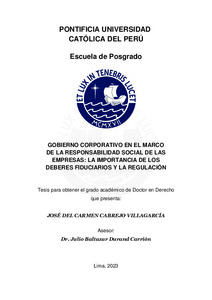| dc.contributor.advisor | Durand Carrión, Julio Baltazar | |
| dc.contributor.author | Cabrejo Villagarcía, José del Carmen | |
| dc.date.accessioned | 2023-06-05T21:49:33Z | |
| dc.date.available | 2023-06-05T21:49:33Z | |
| dc.date.created | 2023 | |
| dc.date.issued | 2023-06-05 | |
| dc.identifier.uri | http://hdl.handle.net/20.500.12404/25128 | |
| dc.description.abstract | La investigación doctoral apunta a entender cualitativamente la relación de
Gobierno Corporativo (GC) y Responsabilidad Social (RSE) en la actividad empresarial,
extendiendo esta relación al rol de los Deberes Fiduciarios y la Regulación. Tiene como
hipótesis central que GC y RSE son instrumentos y vehículos del desarrollo económico y
social que deben desplegarse desde la actividad empresarial, considerando a la base la
concepción de empresa como un equipo de producción, vinculado por un nexo
contractual. En esta media, GC en el marco de la RSE, es el sistema de dirección y control
que tiene como objetivo orientar los recursos empresariales a la creación de valor para
todos los integrantes del equipo de producción, la economía y la sociedad en la que
desarrollan su actividad. Los Deberes Fiduciarios constituyen la piedra angular de la fase
jurídica de la dirección y control de las empresas, que pueden convertirse en una
herramienta del desarrollo económico y social. El rol de la regulación, es crítico, y
comprende elementos regulatorios de mercado, estatal, judicial y mixtos, que empoderan
el engranaje empresarial.
Se concluye que desde la economía de mercado y las teorías del Nexus-of-
Contractus y el Equipo de Producción, GC en el marco de la RSE, pueden reexpresarse
en su propósito privado y público. En nuestro país, es posible hacerlo, gracias a diversas
normas, entidades y prácticas de auto-regulación transversales al ecosistema empresarial.
Ello incluye al entorno legal, con cierto sesgo por la Teoría de la Propiedad Privada y el
Paradigma del Accionista. | es_ES |
| dc.description.abstract | The Thesis aims to qualitatively understand the relationship between Corporate
Governance (CG) and Corporate Social Responsibility (CSR) in corporate activity,
extending this relationship as to the role of Fiduciary Duties and Regulation. The central
hypothesis of the Thesis is that CG and CSR are instruments and vehicles of economic
and social development arising from the corporate activity, considering at the base, the
conception of corporations as team production entities, linked by a contractual nexus. In
this mean, CG within the framework of CSR, is the direction and control system that
aims to guide corporate resources for the value-creation to all members of the
production team, the economy and the society in which they develop their economic
activity and not only to their shareholders. Fiduciary Duties constitute the cornerstone
of the legal phase of the direction and control of corporations, which can become a tool
for economic and social development. The role of regulation is critical, and includes
market, state, judicial, and mixed regulatory elements that empower the corporate gear.
It is concluded that from the Theory of Market Economy and the Theories of the
Nexus-of-Contractus and Team Production, CG within the framework of CSR, can be
re-expressed in their private and public purpose. In Peru, it is possible to do so, thanks
to various standards, entities, and self-regulation practices that cut across the corporate
ecosystems. This re-expression includes the legal environment, somewhat tainted by the
Private Property Theory and the Shareholder Paradigm of corporations. | es_ES |
| dc.language.iso | spa | es_ES |
| dc.publisher | Pontificia Universidad Católica del Perú | es_ES |
| dc.rights | info:eu-repo/semantics/openAccess | es_ES |
| dc.rights.uri | http://creativecommons.org/licenses/by-sa/2.5/pe/ | * |
| dc.subject | Responsabilidad social de las empresas--Legislación--Perú | es_ES |
| dc.subject | Gobierno corporativo--Legislación--Perú | es_ES |
| dc.subject | Organismos reguladores--Legislación--Perú | es_ES |
| dc.title | Gobierno corporativo en el marco de la responsabilidad social de las empresas: la importancia de los deberes fiduciarios y la regulación | es_ES |
| dc.type | info:eu-repo/semantics/doctoralThesis | es_ES |
| thesis.degree.name | Doctor en Derecho | es_ES |
| thesis.degree.level | Doctorado | es_ES |
| thesis.degree.grantor | Pontificia Universidad Católica del Perú. Escuela de Posgrado | es_ES |
| thesis.degree.discipline | Derecho | es_ES |
| renati.advisor.dni | 06726360 | |
| renati.advisor.orcid | https://orcid.org/0000-0002-2926-1912 | es_ES |
| renati.author.dni | 07860283 | |
| renati.discipline | 421018 | es_ES |
| renati.juror | Pazos Hayashida, Javier Mihail | es_ES |
| renati.juror | Peña Jumpa, Antonio Alfonso | es_ES |
| renati.juror | Durand Carrion, Julio Baltazar | es_ES |
| renati.juror | De La Haza Barrantes, Antonio Humberto | es_ES |
| renati.juror | Montoya Alberti, Hernando | es_ES |
| renati.level | https://purl.org/pe-repo/renati/level#doctor | es_ES |
| renati.type | https://purl.org/pe-repo/renati/type#tesis | es_ES |
| dc.publisher.country | PE | es_ES |
| dc.subject.ocde | https://purl.org/pe-repo/ocde/ford#5.05.01 | es_ES |







